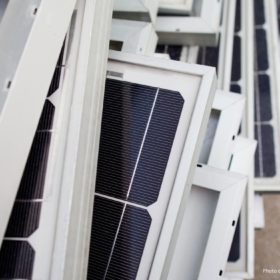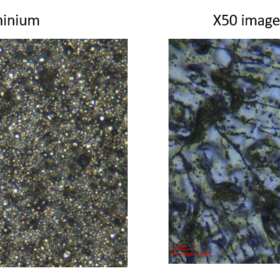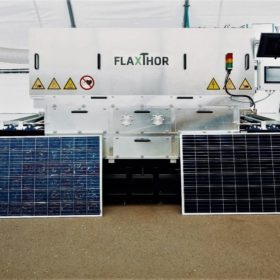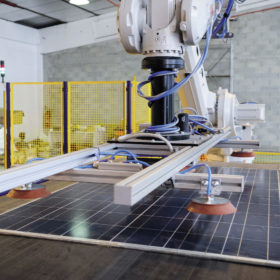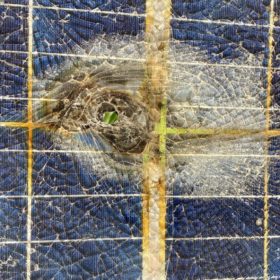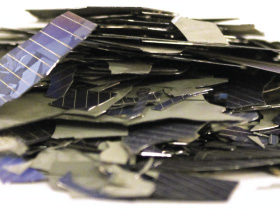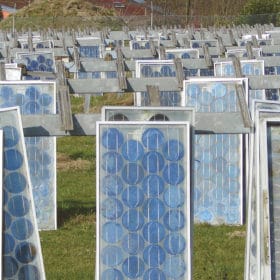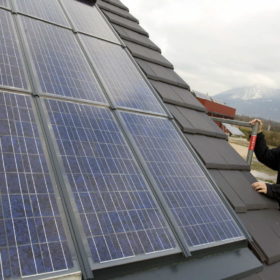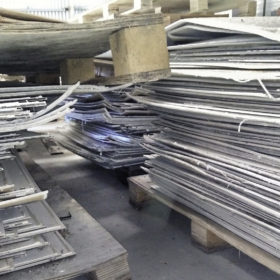Netherlands raises solar panel recycling fee to ‘absorb shocks’ in market
PV module importers in the Netherlands saw the solar module recycling fee increase from €6.50 ($6.8) per ton to €40 per ton in July. In a chat with pv magazine, Jan-Willem Jehee, operations manager at Stichting Zonne-energie Recycling Nederland (ZRN), explains the money generated from the fee hike will be used to finance a guarantee fund that would ‘absorb shocks in the market should one occur.’
Taiwanese consortium develops easily recyclable solar module
The Industrial Technology Research Institute (ITRI) and United Renewable Energy (URE) have developed a solar panel that can be easily dismantled to simplify the recycling process. They claim that 96% of the materials in the panel can be recovered, including all of the solar cells and front glass.
Novel tech to recycle silver, aluminum from end-of-life solar panels
Researchers at the University of Leicester have developed a new method of extracting silver and aluminum from end-of-life PV cells using iron chloride and aluminum chloride dissolved in brines. According to them, the cheap solvents retrieve up to 95% of the metals within 10 minutes, achieving a 98% purity of silver chloride.
Industrial process for ‘mobile’ solar module recycling
German company Flaxres has developed an industrial process to recycle PV modules, and has begun operating a pilot facility at its new site where 10 tons of solar modules can be recycled daily. Flaxres plans to make equipment based on this facility available to international customers.
Module durability, and design for recycling
A new report published by the International Energy Agency offers a series of guidelines for the design of recyclable PV modules. The report aims to help manufacturers find the balance between durability and recyclability, to better address concerns about the 78 million tons of end-of-life PV modules expected by 2050.
Increasing volumes for PV module recycling in Brazil
Brazilan PV module recycling specialist SunR has already recycled 30 tons of panels and expects to receive another 125 tons. According to its CEO, demand for recycled panels, especially broken panels, has increased considerably in recent years.
Establishing a solar module recycling system in India
Ankit Kapasi and Kishore Ganesan from SOFIES India are working on the Solar Waste Action Plan (SWAP) project in India, which is looking to investigate both the technical and economic feasibility of a PV module recycling system in the country. The pilot has been funded by Signify Foundation and Doen Foundation. The team at Sofies is working closely with technology partner Poseidon Solar and established the first PV recycling pilot plant in September 2020. The duo spoke to pv magazine India about their plant’s techno-commercial feasibility and the Indian eco-system’s readiness for PV module recycling.
PV module recycling could harm US solar industry
The PV industry can’t claim to be a clean energy source if it leaves a trail of hazardous waste.
Interview: Applying circular solutions to solar waste manufacturing and end-of-life modules
EVA films are a key barrier to solar module recycling because of the glues involved in their use. An EU-funded research project is aiming to address the issue, among others, with a circular manufacturing approach. pv magazine spoke to two of the professionals involved in the EU-backed Cabriss project.
Solar panel recycling: Turning ticking time bombs into opportunities
Australia has certainly demonstrated its appetite for solar power. Now, with the average lifespan of a solar panel being approximately 20 years, many installations from the early 2000’s are set to reach end-of-life. Will they end up in landfill or be recycled? The cost of recycling is higher than landfill, and the value of recovered materials is smaller than the original, so there’s limited interest in recycling. But given the presence of heavy metals, such as lead and tin, if waste is managed poorly, we’re on track for another recycling crisis. A potential time bomb could present itself as an opportunity, however, if the global EV industry showed an interest in the recovered solar products.
